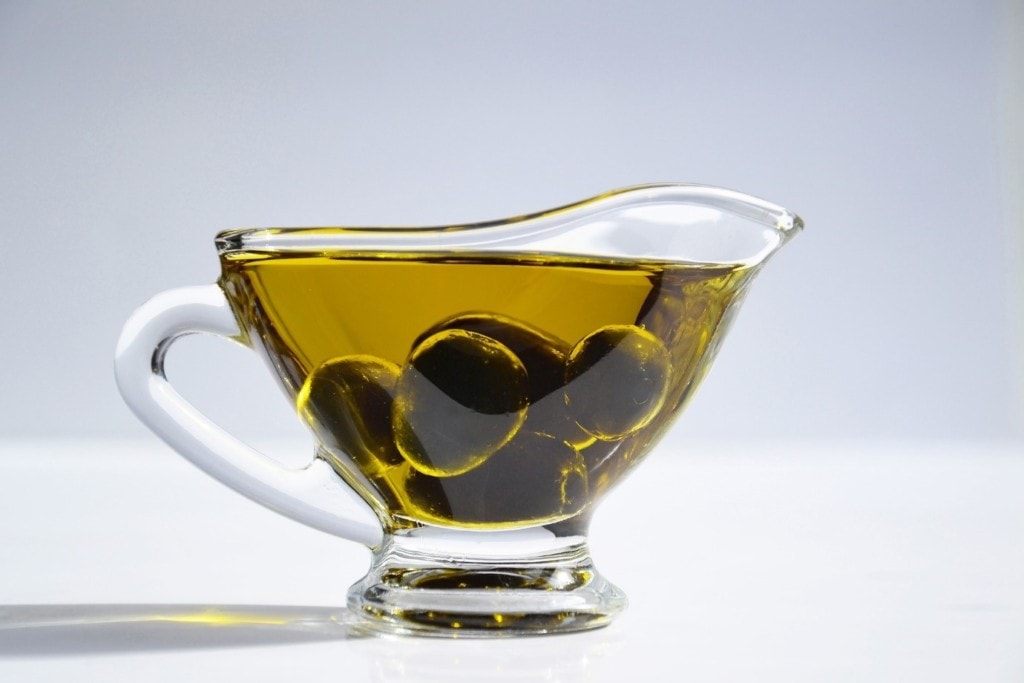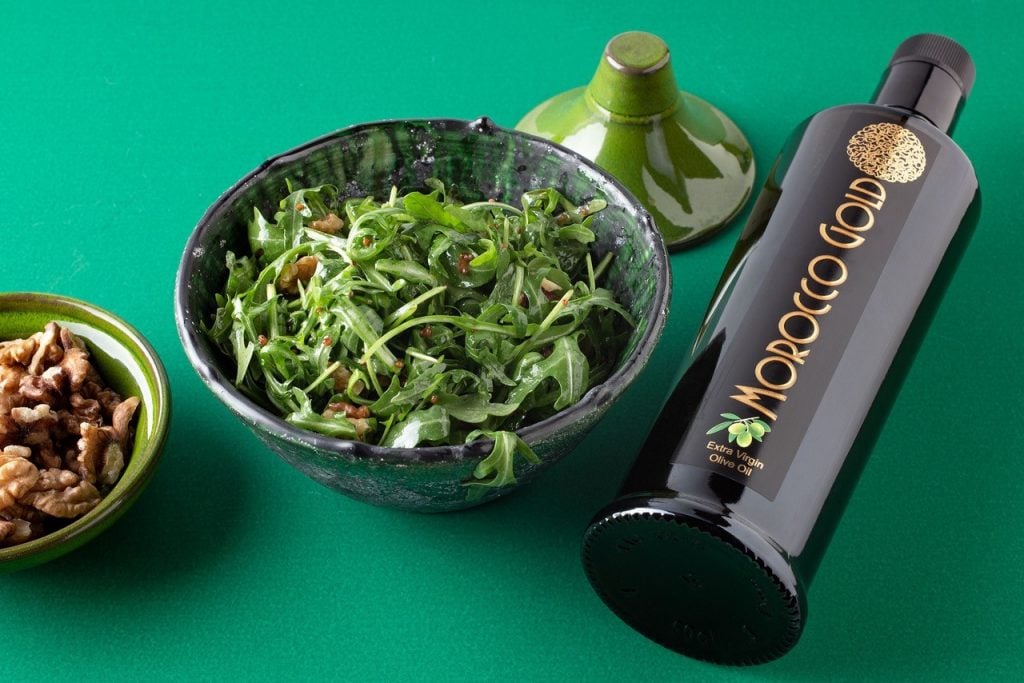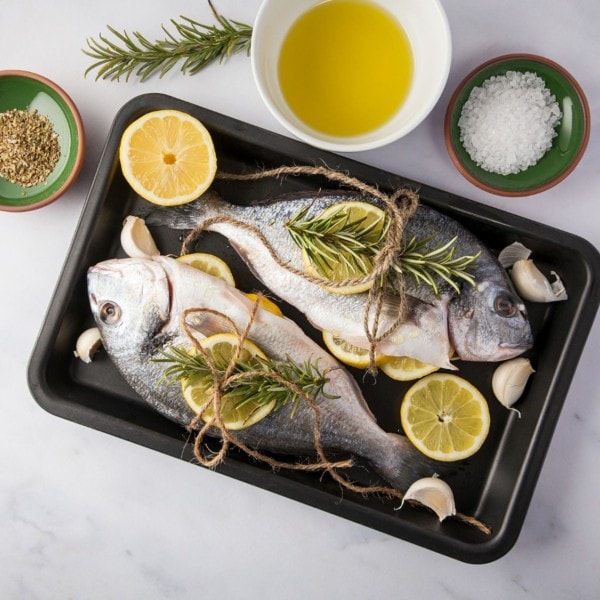Dietician Explains How To Swap Vegetable Oil For Extra Virgin Olive Oil
Updated September 20th 2024

Summary
- Extra virgin olive oil offers a versatile and healthy alternative to vegetable oil in a wide range of cooking styles.
- Extra virgin olive oil has a high content of monounsaturated fats and antioxidants whereas some vegetable oils can contain unhealthy levels of trans fats and omega-6 fatty acids.
- High quality olive oil like Morocco Gold contains oleocanthal, as well as oleuropein, a substance that protects LDL (bad) cholesterol from oxidation.
Contents
- Is Extra Virgin Olive Oil Healthier Than Vegetable Oil?
- The Nutritional Comparison of Extra Virgin Olive Oil Versus Vegetable Oil
- Comparing Extra Virgin Olive Oil And Vegetable Oil: Why Are They Different?
- Why Extra Virgin Olive Oil Is a Healthy Substitute For Vegetable Oil.
- Extra Virgin Olive Oil Nutritional Info
A professional dietician has told Eatingwell.com that swapping vegetable oil for extra virgin olive oil can often be a great choice for health and flavour. But, they advised that it’s worth considering your choice of oil carefully before you start cooking.
In the world of cooking oils, the debate between extra virgin olive oil and vegetable oil is as old as time. Health enthusiasts, foodies, and home cooks alike often find themselves standing in grocery store aisles, pondering which oil to choose for their culinary adventures. This blog post aims to clear up the confusion and help you make an informed decision about the best oil for your kitchen.
Is Olive Oil Healthier Than Vegetable Oil?
When it comes to selecting the healthiest oil, many people turn to extra virgin olive oil. This oil is renowned for its numerous health benefits, primarily due to its high content of monounsaturated fats and antioxidants. These components have been linked to a reduced risk of heart disease, improved brain function, and even a lower risk of certain cancers.
On the other hand, vegetable oil is often seen as the more budget-friendly option. It is widely available, versatile, and commonly used in various recipes. However, not all vegetable oils are created equal. Many are highly processed and can contain unhealthy levels of trans fats and omega-6 fatty acids, which can contribute to inflammation and other health issues.
Stating the case for using extra virgin olive oil in your cooking, Breana Lai Killeen M.P.H. , R.D. said:
While the calorie and total fat content of olive oil versus vegetable oil is essentially the same, the type of fat is different. Extra-virgin olive oil has a higher proportion of beneficial monounsaturated fats, and less polyunsaturated and saturated fat. Swapping out saturated fat for unsaturated fats has been shown to reduce mortality, but consuming monounsaturated fat, specifically, has been shown to reduce blood pressure, improve cholesterol, reduce breast cancer risk and aid in weight control.
Specifically, extra-virgin olive oil contains the antioxidants vitamin E and oleuropein, which fight free radicals and reduce inflammation. Oleuropein might also protect against diabetes.
Breana Lai Killeen M.P.H. , R.D.
The Nutritional Comparison of Extra Virgin Olive Oil Versus Vegetable Oil
One of the most significant differences between extra virgin olive oil and vegetable oil lies in their nutritional profiles. Extra virgin olive oil is rich in monounsaturated fats, which are known for their heart-protective properties. It also contains antioxidants like vitamin E and polyphenols, which help fight oxidative stress and inflammation.
In contrast, vegetable oil, depending on its source, may have a higher concentration of polyunsaturated fats. While these fats can be beneficial in moderation, they are more susceptible to oxidation when heated, which can lead to the production of harmful free radicals. Additionally, the refining process that many vegetable oils undergo can strip away essential nutrients, leaving a product that is less beneficial to your health.
Another critical aspect to consider is the smoke point of each oil. The smoke point is the temperature at which an oil begins to break down and produce harmful compounds. Extra virgin olive oil has a relatively low smoke point compared to some vegetable oils, making it more suitable for low- to medium-heat cooking. On the other hand, refined vegetable oils typically have higher smoke points, making them better suited for high-heat cooking methods like frying.
Writing in Eatingwell.com, Breana Lai Killeen M.P.H. , R.D. set out the key nutritional data for extra virgin olive oil and vegetable oil, as follows:
Per the USDA, a 1-tablespoon serving of each oil contains:
| Extra-Virgin Olive Oil | Vegetable Oil |
| 119 calories | 124 calories |
| 14 g total fat | 14 g total fat |
| 2 g saturated fat | 2 g saturated fat |
| 10 g monounsaturated fat | 6 g monounsaturated fat |
| 1 g polyunsaturated fat | 6 g polyunsaturated fat |
| 0 g carbohydrate | 0 g carbohydrate |
| 0 g protein | 0 g protein |
Comparing Extra Virgin Olive Oil And Vegetable Oil: Why Are They Different?
When it comes to cooking oils, olive oil and vegetable oil are two of the most popular, but which is better for your health: extra virgin olive oil or vegetable oil?
Extra virgin olive oil is made from the first cold pressing of olives and has a higher concentration of healthy monounsaturated fats than other types of olive oil. It’s also rich in antioxidants and has been shown to lower cholesterol levels and reduce inflammation. That’s a pretty impressive and compelling list of reasons to choose extra virgin olive oil instead of vegetable oil, we think!
Vegetable oil, on the other hand, is a blend of different oils that are extracted from plants. The most common type of vegetable oil is canola oil, but soybean, corn, and sunflower oils are also commonly used. Unlike extra virgin olive oil, vegetable oils are refined and some have a higher smoke point, which makes them better suited for high-heat cooking methods like frying.
However, a quality extra virgin olive oil like Morocco Gold can sustain most types of cooking also.
So, which one should you use? Both extra virgin olive oil and vegetable oil have their benefits, so it really depends on what you’re looking for. As ever, we have some more information on the differences between Olive Oil and Vegetable Oil below to help guide you.
Why Extra Virgin Olive Oil Is a Healthy Substitute For Vegetable Oil.
Extra virgin olive oil is a good substitute for vegetable oil in many recipes. It has a mild flavor that goes well with many foods, and it is a healthier option than most other oils. Extra virgin olive oil is also versatile, and can be used for cooking or as a salad dressing. If you’re looking for a healthy and delicious way to reduce your intake of unhealthy fats, consider using extra virgin olive oil instead of vegetable oil.
When you visit your local supermarket, it’s easy to be overwhelmed by the choice of vegetable oils, olive oils and multiple other cooking oils on offer but – when it comes to wellness – we believe the best overall choice you can make is a quality extra virgin olive oil. But don’t take our word for it. Read on to discover the science behind the claims that support extra virgin olive oil as a substitute for vegetable oil.
What is the Difference Between Vegetable Oil and Olive Oil?

Vegetable oil and olive oil are both fats that are extracted from plants. Vegetable oils are typically made from seeds, while olive oil is made from olives. Vegetable oils are usually cheaper than olive oil, but they are also less healthy. Olive oil is a healthier fat because it is high in monounsaturated fats and antioxidants. These nutrients can help to lower cholesterol levels and reduce the risk of heart disease.
To remain healthy, we need moderate amounts of the right type of unsaturated fats eaten as part of a good, balanced diet such as the Mediterranean Diet.. However, a high fat intake and in particular, a high intake of saturated fats is associated with raised blood cholesterol and coronary heart disease.
In addition, olive oil has a higher smoke point than vegetable oil, which means that it can be used for cooking at higher temperatures without burning. For these reasons, olive oil is the better choice for both your health and your kitchen.
While vegetable oil is typically made by blending the oils from a variety of nuts, fruits and seeds, olive oil is a natural juice that is derived from the olive and can be consumed freshly pressed from the fruit.
As explained perfectly:
“Olive oil has more health benefits and is a more natural oil compared to vegetable oil. Olive oil has a lower smoke point than vegetable oil because it has a lower fat content than vegetable.”
fitday.com
Crucially, Olive oil is rich in monounsaturated fats, which lowers cholesterol. And, Extra virgin olive oils such as Morocco Gold also contain high quantities of polyphenols – an antioxidant that protects the body from free radical damage. Olive oil has the largest amount of heart healthy monounsaturated fat compared to all other naturally produced oils.
Studies Show Health Benefits Of Cooking With Extra Virgin Olive Oil

The health benefits of olive oil are well known, especially from the studies of the Mediterranean diet and its use of extra virgin olive oil and it’s high antioxidant properties. However, recent research has shown that extra virgin olive oil retains its healthy properties when used for cooking, according to Yahoo UK.
The study, published by the journal Antioxidants, is the collaborative work of a team of researchers from the Faculty of Pharmacy and Food Sciences of the UB, the Physiopathology of Obesity and Nutrition Networking Biomedical Research Centre (CIBERobn) and the University of São Paulo.
Extra virgin olive oil is the main source of fat in the Mediterranean diet and shows a unique composition of fatty acids with a higher content of antioxidants than other edible oils. Its benefits for the health are mainly linked to these compounds, named polyphenols.
For the study, researchers simulated the cooking conditions of a domestic kitchen. The aim was to see how using extra virgin olive oil to sauté affects the polyphenols. Researchers studied the effects of temperature and the time taken in the degradation of the antioxidants.
Results show that during the cooking process, the content of polyphenols decreased by 40 per cent at 120 ºC and by 75 per cent at 170 ºC, compared to the levels of antioxidants in raw oil. The cooking time affected individual polyphenols, but not the total content of the phenols. The levels of antioxidants still fulfilled the levels required by the EU to be still classed as healthy.
This strengthens the idea of Mediterranean gastronomy being beneficial for our health, not only for its food but also for techniques used in cooking it.
We are always delighted to come across articles that confirm our own extensive researches into extra virgin olive oil benefits and it’s nutritional info. We know extra virgin olive oil is the healthiest fat on the planet. Here is a wonderful summary from: https://www.healthline.com/nutrition/extra-virgin-olive-oil.
Extra Virgin Olive Oil Nutritional Info
Extra virgin olive oil is nutritious. It contains modest amounts of vitamins E and K and plenty of beneficial fatty acids.
Some more olive oil nutritional info – One tablespoon (13.5 grams) of olive oil contains the following:
- Saturated fat: 14%
- Monounsaturated fat: 73% (mostly oleic acid)
- Vitamin E: 13% of the Daily Value (DV)
- Vitamin K: 7% of the DV
Notably, extra virgin olive oil shines in its antioxidant content. Antioxidants are biologically active, and some of them can help fight serious diseases. The oil’s main antioxidants include the anti-inflammatory oleocanthal, as well as oleuropein, a substance that protects LDL (bad) cholesterol from oxidation.
Olive oil is very high in monounsaturated fats and contains a modest amount of vitamins E and K. True extra virgin olive oil is loaded with antioxidants, some of which have powerful health benefits. It’s clear that the extra virgin olive oil is a worth while substitute for vegetable oil.
